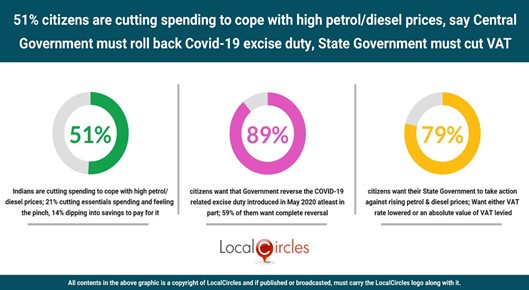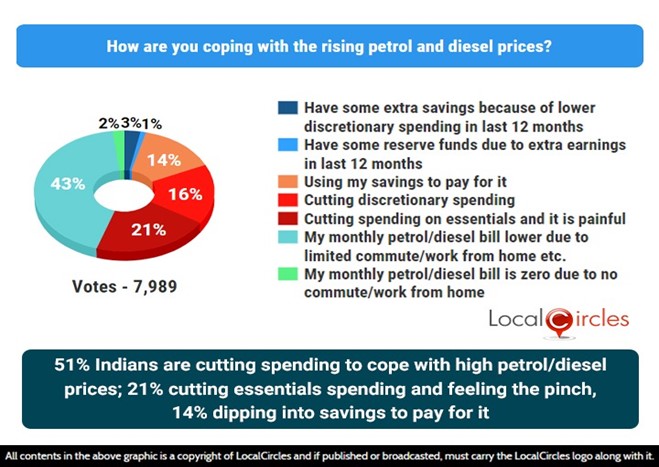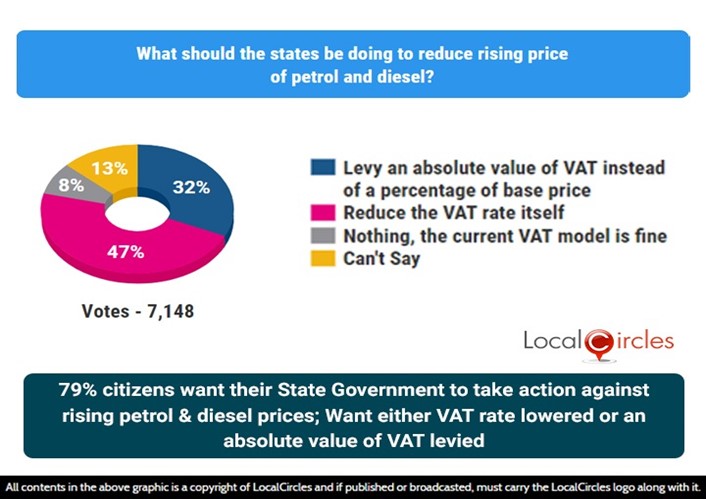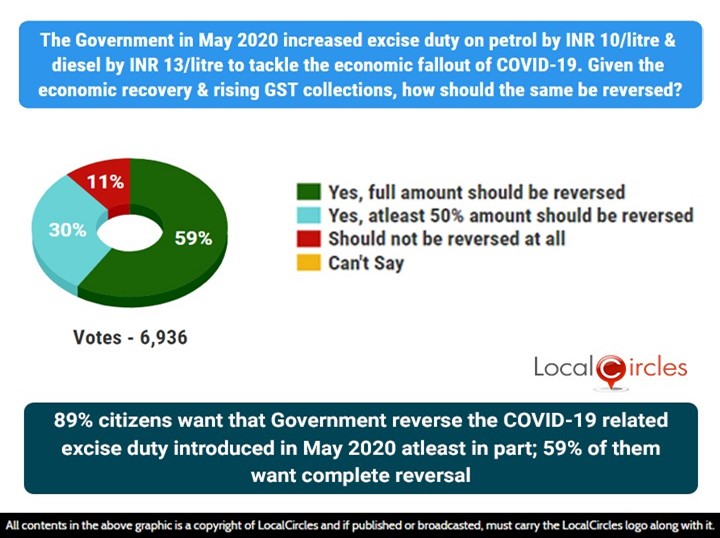51% citizens are cutting spending to cope with high petrol/diesel prices; Of them 21% are in real pain and cutting spending on essentials, 14% dipping into savings
- ● 89% want Government to reverse the COVID-19 related excise duty introduced in May 2020
- ● 79% want their State Government to either lower or levy an absolute value of VAT
51% citizens are cutting spending to cope with high petrol/diesel prices, say Central Government must roll back Covid-19 excise duty, State Government must cut VAT

February 22, 2021, New Delhi: The rising price of fuel in India is nearing INR 100 for petrol and INR 90 for diesel in several states of India and is the latest to become a harsh reality in the aftermath of the COVID-19 pandemic. When the prices of petrol and diesel rise, it has an adverse impact on how citizens commute, how much essentials and other goods cost, and how people draw up their personal finance, especially for the millions of them, middle class and below in India’s household pyramid with many still trying to recover from the impact of the economic fallout of the pandemic.
LocalCircles has conducted a study to understand how people of India are coping with the skyrocketing price rise of petrol and diesel in the last 12 months and what should be done by the Government, both Centre and State, to provide immediate relief to citizens. The survey received more than 22,000 responses from citizens located in over 291 districts of the country bringing out the pulse of the nation on the issue.
51% Indians are cutting spending to cope with high petrol/diesel price; 21% cutting essentials spending and feeling the pinch, 14% dipping into savings to pay for it
The Covid-19 pandemic has induced a giant-fall in citizens’ personal finance, especially for those who lost their jobs, faced salary cuts and delays or a loss in business volumes, with most being the bread-earners of the family. The rise in price of any commodity directly impacts their personal finance or savings and many of them have been cutting their discretionary spending. In the first question the survey tried to understand how people are coping with the rising petrol and diesel prices, 3% “have some extra savings because of lower discretionary spending in the last 12 months”, 1% “have some reserve funds due to extra earnings in the las 12 months”, 14% are “using savings to pay for it”, 16% are “cutting discretionary spending”, and 21% said “cutting spending on essentials and it is painful”. There were also 43% of citizens saying “my monthly petrol or diesel bill is lower due to limited commute or work from home, etc.”, and 2% said “my monthly petrol or diesel bill is zero due to no commute or work from home”. Per aggregate response from people, 51% of Indians are cutting spending to cope with high petrol/diesel prices; 21% are cutting essentials spending and feeling the pinch, 14% are dipping into savings to pay for it. This question in the survey received 7,989 responses.

79% citizens want their State Government to take action against rising petrol & diesel prices; want either VAT rate lowered or an absolute value of VAT levied
While the base price, per various studies, comprises 36% of the retail petrol price, states value-added tax (VAT) makes up 23%, of the final fuel price. Other factors in the retail price of petrol and diesel include excise duty and road and infrastructure levied by Central Government and soon agriculture infrastructure cess, BS IV premium, marketing cost and margins, dealers commission, etc. With an objective to understand pulse of the people on what their respective State Government should be doing to reduce the rising price of petrol and diesel, 32% said “levy an absolute value of VAT instead of a percentage of base price”, and 47% said “reduce the VAT rate itself”. There were, however, 8% of consumers who voted for “nothing, the current VAT model is fine”, while 13% couldn’t say. Findings from the poll that received 7,148 responses indicate that 79% of citizens want their State Government to take action against rising petrol & diesel prices; want either VAT rate lowered or an absolute value of VAT levied. An absolute VA levied instead of a percentage VAT can help keep the prices lower even if base price of petrol and diesel rises in the coming months.
79% citizens want their State Government to take action against rising petrol & diesel prices; want either VAT rate lowered or an absolute value of VAT levied

89% of consumers want the Government to reverse the COVID-19 related excise duty introduced in May 2020 atleast in part, while 59% of them want complete reversal
As the country went into a COVID induced lockdown, the Central Government in May 2020, increased excise duty on petrol by INR 10 per litre and diesel by INR 13 per litre in the form of excise duty and road infrastructure cess in a bid to shore up falling revenues to compensate for the fall in demand due to the outbreak. However, it also put any price revisions on hold for over two months. The final poll in the survey asked citizens that given the economic recovery and rising GST collection, how should the same be reversed. To the poll question that received 6,936 responses, 59% said “Yes, full amount should be reversed”, and 30% said “Yes, atleast 50% amount should be reversed.” There were also 11% citizens who said that it “should not be reversed at all.” So in summary, 59% of the citizens want a complete reversal of this COVID related increase while 30% want atleast a partial reversal.

In summary, the common citizen is now feeling the pinch of high petrol and diesel prices. This is evident that 51% of the people surveyed are cutting their spending. What is most concerning is that 21% are cutting spending on essentials which is the tomato, potato, onions, rice, wheat pulses etc. A lower middle-class individual has limited room in their monthly expenses and if the cost of operating a two-wheeler or the public transport cost and the cost of essentials rises, they have no option but to cut one of those expenses to cope up. Given that the COVID related excise duty and road infrastructure cess was increased in May 2020 to make up for loss of revenue and that economy is seeing a recovery, the Central Government must consider reversing this partially or fully. That is what 89% citizens who were surveyed, want. Also, people want their State Government to do their bit by reducing the VAT rate on petrol and diesel or levy the VAT in absolute term such that even if the base price of fuel rises, the impact on citizens as far as state VAT goes is capped.
LocalCircles will share the findings of the survey to the Ministry of Finance and related Government departments as well as Chief Secretaries of all states of India so that the public feedback on the issue is given the consideration it deserves.
Survey Demographics
22,000+ responses were received from citizens residing in 291 districts of India. 68% respondents were men while 32% respondents were women. 44% respondents were from tier 1, 29% from tier 2 and 27% respondents were from tier 3, 4 and rural districts. They survey was conducted via LocalCircles platform and all participants are validated citizens who had to be registered with LocalCircles to participate in this survey.
About LocalCircles
LocalCircles, India’s leading Community Social Media platform enables citizens and small businesses to escalate issues for policy and enforcement interventions and enables Government to make policies that are citizen and small business centric. LocalCircles is also India’s # 1 pollster on issues of governance, public and consumer interest. More about LocalCircles can be found on https://www.localcircles.com
For more queries - media@localcircles.com, +91-8585909866
All content in this report is a copyright of LocalCircles. Any reproduction or redistribution of the graphics or the data therein requires the LocalCircles logo to be carried along with it. In case any violation is observed LocalCircles reserves the right to take legal action.


